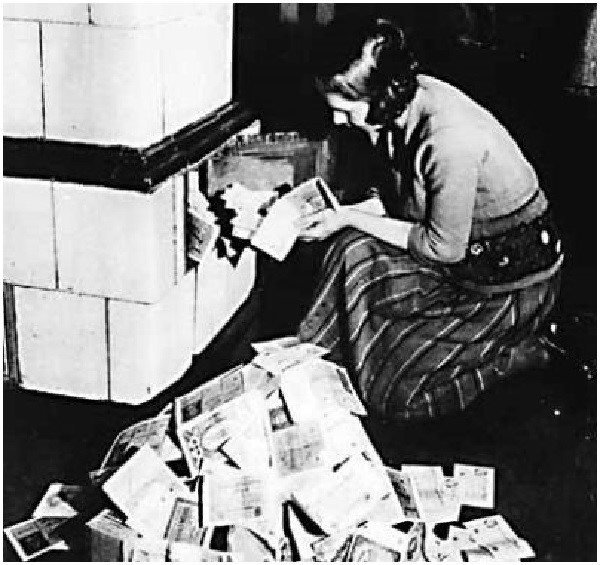How Long Until Inflation Breaks Germany?
Almost alone among the world’s serious nations, Germany has scenes like this within living memory:

During the 1923 Weimar Republic hyperinflation, newly-broke Germans burned their life savings to keep warm or carted wheelbarrows of cash to stores to buy bread and milk. This wipe-out of an entire generation’s wealth led directly to Hitler and WWII, arguably the two dumbest mistakes made by any country ever.
So these guys understand the threat of a dying currency better than perhaps anyone else. Which must make what’s happening now especially intense. Here’s Germany’s current inflation rate:

Note how in the recent past, before the Deutsche Bundesbank was replaced by the European Central Bank, short-term German interest rates were always set above the inflation rate in order to keep prices under control.
But those days are over. Since the Great Recession, German interest rates have been consistently below the rate of inflation, apparently to encourage even faster price increases.
So the question becomes: How much more of this can Germany take before it breaks from the eurozone and starts trying to save itself?
BERLIN, Nov 30 (Reuters) – Germany’s incoming Finance Minister Christian Lindner on Tuesday vowed to champion solid public finances and a reduction of debt levels across the euro zone so that the European Central Bank (ECB) could fight inflation without hesitation if needed.
Lindner’s comments, posted on Twitter, came after data showed on Monday that German consumer price inflation accelerated further in November to reach its highest level in nearly three decades.
“The inflation gives rise to legitimate concerns. In the case of currency devaluation, we’ll observe how it develops after the pandemic,” Lindner wrote in his tweets.
“In Europe and Germany, we’ll advocate solid public finances and limiting debt. Excessively high government deficits would restrict the ECB from fighting inflation if necessary,” Lindner warned.
His remarks were echoed by outgoing Bundesbank President and ECB policymaker Jens Weidmann who said the ECB should keep an arm’s length from governments by resisting pressure to bankroll indebted states or pursue goals other than price stability.
Translated from bureaucrat-speak, the message is that they’re willing to accept the pandemic as an excuse for avoiding extreme action on inflation for a while, but not forever.
Which raises a second, tougher question: Is controlling inflation even possible without blowing up all the over-leveraged countries, companies and individuals that now depend on an implied German backstop for their own financial survival? Specifically, will anyone in their right mind lend money to Italy if Germany is demanding that EU members balance their budgets while the ECB raises interest rates?
The answer is a hard no, which would lead Italy et al to either leave the eurozone and go back to their old currencies or simply default on their euro debt.
From a German perspective, would a disolution of the euro common currency be worse than a return to double-digit inflation? They’ll have to decide pretty soon.
********
















